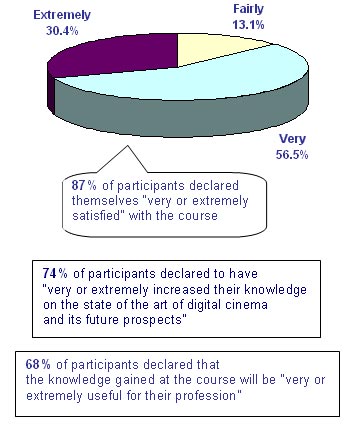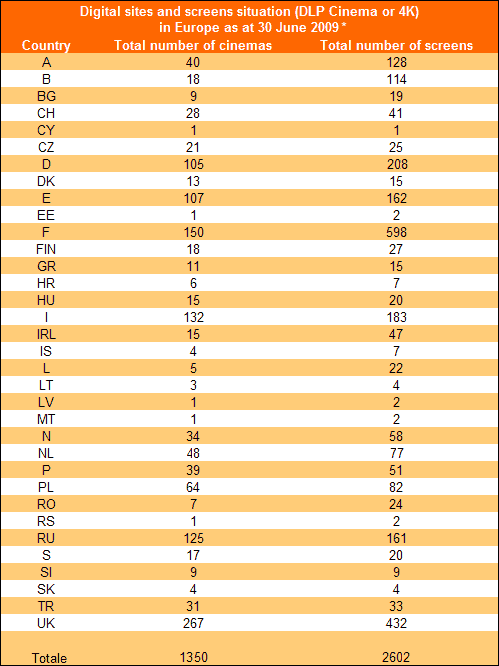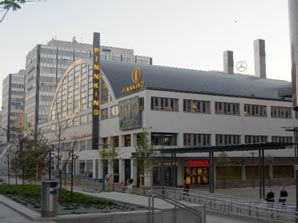
Reg. Trib. Milano n. 418 del 02.07.2007
Direttore responsabile: Elisabetta Brunella
![]()
![]()
International Edition No. 50 - year 4 - 12 November 2009

***
Dear readers,
 on
behalf of MEDIA Salles, I am glad to invite
the European cinema professionals to the “DigiTraining Plus 2010”
in Helsinki, in February 2010. Thanks to the Finnish Film Foundation
and the Finnish Chamber of Films, it has been made possible for MEDIA
Salles to launch the seventh edition of our course on digital cinema
for the first time in a Nordic country. Interesting also because the
state of Finland shows a special engagement in developing the eminent
but difficult transition from analogue to digital technology in the
cinemas.
on
behalf of MEDIA Salles, I am glad to invite
the European cinema professionals to the “DigiTraining Plus 2010”
in Helsinki, in February 2010. Thanks to the Finnish Film Foundation
and the Finnish Chamber of Films, it has been made possible for MEDIA
Salles to launch the seventh edition of our course on digital cinema
for the first time in a Nordic country. Interesting also because the
state of Finland shows a special engagement in developing the eminent
but difficult transition from analogue to digital technology in the
cinemas.
See you in Helsinki and make sure to bring
woollen mittens!
Jens Rykaer
President of MEDIA Salles
Welcome to Digital Odyssey 2010 in Helsinki!
 Digital
transformation is on its way both in cinemas and distribution. It is
quite predictable that it will go faster and faster during the next
few years, so it is essential to understand how we can most benefit
from the new possibilities of an all-digital future. Is there any other
way than training and education to open our eyes to new possibilities?
Digital
transformation is on its way both in cinemas and distribution. It is
quite predictable that it will go faster and faster during the next
few years, so it is essential to understand how we can most benefit
from the new possibilities of an all-digital future. Is there any other
way than training and education to open our eyes to new possibilities?
The “DigiTraining Plus” by MEDIA Salles will be
organized for the first time in Helsinki, Finland in February 2010.
Besides updated information on digital transition from our world-famous
specialists, Finland can offer a rather different view on one of the
most difficult questions in transition: the financing. Most of the digital
screens in Finland are financed to quite a large extent by public funding
from The Finnish Film Foundation.
At the end of this year, 15% of Finnish screens will be digital
and most of them with 3D. For two years now almost all full-length Finnish
feature films have been available in digital format. There is no use
going digital without domestic and European digital content as well
as better circulation of world cinema.
Besides fiction, more and more documentary films are distributed
in digital format. For the audience this means more diversity in the
choice of films, and to cinemas great opportunities to reach and serve
new audiences. Also alternative content, especially live operas from
the Metropolitan, are enjoying more and more interest. But this is just
the beginning.
We shall be glad to see cinema owners, distributors, producers
and other interested participants in Helsinki! Through lectures, discussions,
different case studies and experiences from others we’ll once
again learn a bit more, as we have already done in earlier editions
of the “DigiTraining Plus”.
With best wishes
Harri Ahokas
Head of Domestic Distribution
The Finnish Film Foundation
(Per
leggere il testo in italiano cliccare qui)
WOMEN IN DIGITAL CINEMA
Francesca Piraccini
Cinema Eliseo Multisala,
Cesena (Italy)
 For
around 15 years I have been managing the Cinema Eliseo Multisala in
Cesena, a town of 90,000 inhabitants in the heart of Romagna, about
90 kilometres from Bologna. It is a fine building in the old part of
the town and comprises four screens devoted to both commercial and art-house
movies, seating a total audience of 700, with a hospitable Cinecafé
where aperitifs and tea can be sipped whilst browsing through film magazines
and books on the cinema, as well as an inside bar with popcorn and liquorice.
Equipped as a polifunctional centre, it is able to host conferences
and multi-media events. The venue was opened by my maternal grandfather
in 1949, then altered to house two separate screens in 1992 (one of
the very first in Italy) and later completely restructured in 2006 and
equipped with a first digital projection installation – consisting
of a Christie projector, Doremi server and 3D XpanD system – in
August 2009.
For
around 15 years I have been managing the Cinema Eliseo Multisala in
Cesena, a town of 90,000 inhabitants in the heart of Romagna, about
90 kilometres from Bologna. It is a fine building in the old part of
the town and comprises four screens devoted to both commercial and art-house
movies, seating a total audience of 700, with a hospitable Cinecafé
where aperitifs and tea can be sipped whilst browsing through film magazines
and books on the cinema, as well as an inside bar with popcorn and liquorice.
Equipped as a polifunctional centre, it is able to host conferences
and multi-media events. The venue was opened by my maternal grandfather
in 1949, then altered to house two separate screens in 1992 (one of
the very first in Italy) and later completely restructured in 2006 and
equipped with a first digital projection installation – consisting
of a Christie projector, Doremi server and 3D XpanD system – in
August 2009.
(Click here to read the whole article)
(Per leggere il testo
in italiano cliccare qui)
Steve Perrin nominated head of the UK Digital Funding Group
 The
British cinema exhibitors’ association (CEA) has announced that
Steve Perrin will be head of the UK Digital Funding Group, the office
responsible for negotiating financial support for the digital conversion
of small and medium-sized cinemas in the United Kingdom. Steve Perrin,
previously Senior Vice President and Head of International at Rentrak
Theatrical, who was a speaker at MEDIA Salles’ “DigiTraining
Plus” courses in 2005 and 2006, affirmed: “The launch of
this initiative gives further evidence of the British cinema industry’s
desire to remain at the vanguard of new technology.”
The
British cinema exhibitors’ association (CEA) has announced that
Steve Perrin will be head of the UK Digital Funding Group, the office
responsible for negotiating financial support for the digital conversion
of small and medium-sized cinemas in the United Kingdom. Steve Perrin,
previously Senior Vice President and Head of International at Rentrak
Theatrical, who was a speaker at MEDIA Salles’ “DigiTraining
Plus” courses in 2005 and 2006, affirmed: “The launch of
this initiative gives further evidence of the British cinema industry’s
desire to remain at the vanguard of new technology.”
(Per leggere
il testo in italiano cliccare qui)
|
MEDIA Salles announces Click
here to download the application form • Challenging objectives • To
offer professional players in the world of the cinema, in particular
exhibitors, the knowledge they need to weigh up risks and opportunities
in the transition to digital.
• To
provide an opportunity to meet and exchange experiences on burning
issues such as:
• A unique style
• A successful formula
|
| New
statistics on digital sites and screens situation (DLP cinema or
4K) Acceleration in the increase of Europe’s
digital screens: Europe’s digital screens
are continuing to increase in number, in fact they are accelerating:
the survey carried out every six months by MEDIA Salles shows that
as at 30 June 2009 the number of digital projectors fitted with
DLP Cinema or 4K technology had risen to 2,602, with a growth rate
of 70% compared to 1st January of the same year. A decidedly significant
increase when considering that in the first six month of 2009 alone,
the growth rate for the whole of 2008 (+71%) was almost equalled.
In absolute terms this year digital systems have been installed
at a rate of almost 180 a month, whilst in 2008 the corresponding
figure was a little over 50. The number of screens fitted with digital
projection technology has thus grown to around 7.5% of total screen
numbers in Europe – Russia included. Widespread growth but at different
rates The incidence of digital in
screens as a whole is also patchy Growth is affected by
3D but not only
* This table slightly modifies the one published by MEDIA Salles on 21 October 2009, during the European Workshop “The Digital Cinema Revolution”, held in Rome. For comparison, click here to see the table showing the situation as at 1st January 2009 |
||||||||||||||||||||
| All different, all digital This column hosts portraits of cinemas in Europe and the rest of the world which are quite different from one another but have in common the fact that they have all adopted digital projection. |
||||||||||||||||||||
|
||||||||||||||||||||
Finnkino’s Tennispalatsi In the shape of a giant indoor-tennis centre, in actual fact the cinema complex with the largest audiences in the whole of the Scandinavian region: this is the Kamppi Tennispalatsi, at the heart of Helsinki’s shopping area, just a few steps away from the Esplanade, the fashionable place to go for a stroll in the Finnish capital. With its 14 screens, it draws a million and a half spectators every year, despite its modest and impersonal appearance, particularly when we consider that we are within walking distance of buildings that are icons of twentieth-century architecture, such as E. Saarinen’s central station and the House of Finland by A. Aalto. The “location”, the quality of sound and vision, together with a clever marketing strategy, seem to be the keys to the success of this urban multiplex, the flower in the buttonhole of Finnkino, the exhibition company which covers around 60% of the Finnish market. Tennispalatsi boasts some surprising records: its number 1 theatre is not only the largest in the country (703 seats) but has recently gone 100% digital. In fact, the 35mm projector has yielded to a Christie 2K which is also equipped for 3D presentations. To make it even more special, Finnkino has fitted this theatre with an area corresponding to the “royal box” of the most prestigious theatres, re-baptized the “presidential suite” in republican style. For those who want to experience the thrill of seeing a film in this sector for 17 privileged people, separated from the rest of the audience by a pane of sound-proof glass and equipped with an independent sound installation, it is not so much blue blood as a bit of luck that is needed. There is a storm of bookings – particularly from companies, who frequently combine the screening with a cocktail party or social event in the adjacent Vip Lounge and lobbies – and 2 days out of 3 the suite is occupied during the business season, from mid August to mid June. This is a decidedly interesting piece of business for Finnkino, considering that the overall price for the 17 exclusive seats (with limited access) starts at 600 euros, to which the cost of a reception must be added. With a hardly negligible ‘extra’: a private cocktail party is the only occasion on which it is possible to drink alcohol at the cinema. The full version of this article was published in Italian in the “Giornale dello Spettacolo” no. 15, 1st September 2009.
|
||||||||||||||||||||
| News on the development of digitalisation
in the world Italy: distributors and exhibitors
sign an historical agreement on digital cinema |
||||||||||||||||||||
|
XDC signs the first digital cinema deployment agreements
with independent distributors in Europe |
||||||||||||||||||||
| The Space and Arts Alliance Media sign a
deal for digital cinema roll-out in Italy |
||||||||||||||||||||
| XpanD and Scrabble Entertainment sign India’s
first 3D cinema deployment agreement |
||||||||||||||||||||
Ireland: Digital Finance
announces digital cinema roll-out agreements with 4 major Hollywood
Studios |
||||||||||||||||||||
| Nevafilm announces 250
digital screens by the end of 2009 in Russia |
MEDIA Salles’ contacts and address
MEDIA Salles
Piazza Luigi di Savoia, 24 – 20124 Milano - Italy
Tel.: +39.02.6739781 – Fax: +39.02.6690410
E-mail: infocinema@mediasalles.it
Sito web: www.mediasalles.it




